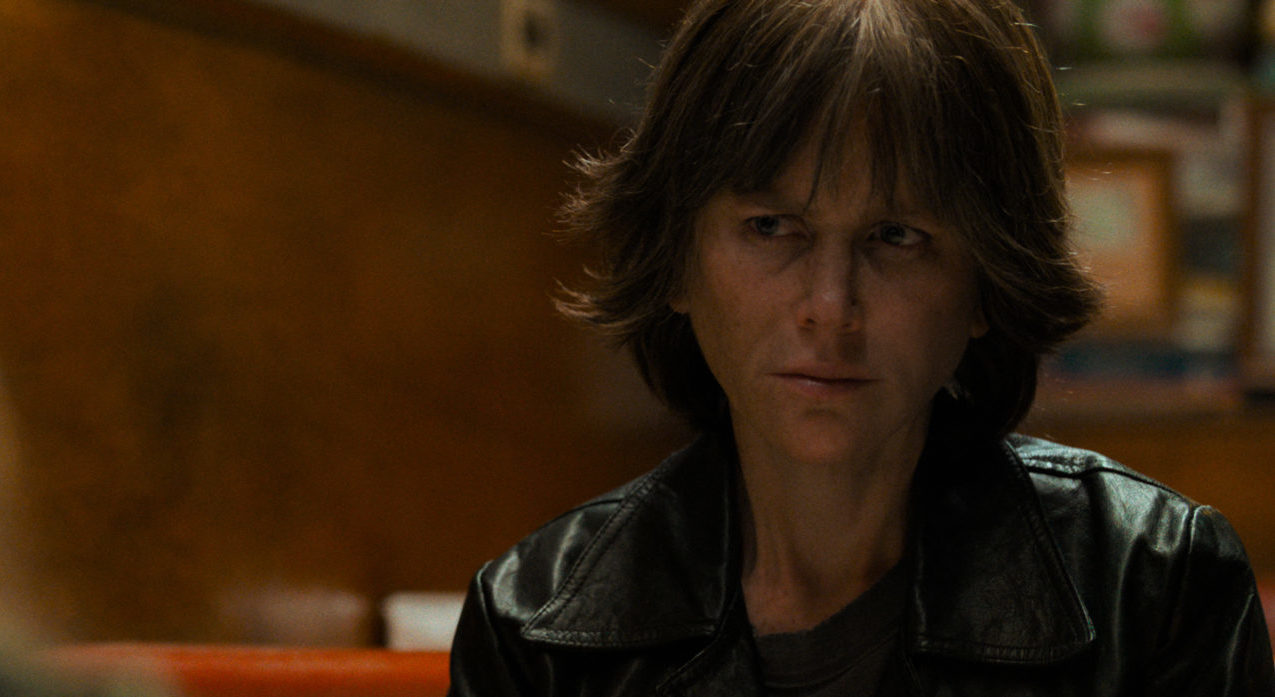The Toronto International Film Festival (TIFF) once again did its duty by spotlighting the next generation of auteurs with the Platform programme. The tightly curated competitive line-up offered a dozen titles from noteworthy up-and-comers working in a range of styles and genres that challenged the three-filmmaker jury of Béla Tarr, Mira Nair, and Lee Chang Dong to select a winner. The ultimate victor of the competition, Ho Wi Ding’s cerebral and moving drama Cities of Lost Things, was a worthy choice for Platform’s fourth edition.
This challenging co-production between Taiwan, China, France, and the USA recalled the early work of Wong Kar-wai with its stylish multi-narrative ensemble that spanned generations and genres. The film witnesses the life of an ex-police officer named Zhang Dong Ling (Jack Kao) as it comes to a crashing end in Taipei in the near-distant future of 2056 when humans are implanted with tracking devices and everyone has a surveillance camera embedded under his or her skin. Told in reverse-chronological order, Cities of Last Things presents Zhang’s downfall in one fateful night when his wife’s infidelity unlocks within him a violent fury that has been dormant for years.
The film jumps back in time with each act as younger incarnations of Zhang illuminate the sense of abandonment that was so pronounced by the end of his life. The final act of the film shifts perspectives as it sees the world through the eyes of a career criminal named Big Sister Wang, who has a surprisingly intimate connection to Zhang. This act elevates the film after its uneven first two acts thanks to the tour-de-force performance by Ning Ding as Big Sister Wang. She commands the screen as she evades the police in a collision course with fate. The stylish and atmospheric Cities of Last Things doesn’t always work in its lofty ambitions (and sporadic misogyny), but it ends strongly thanks to the emotional wallop that Ning brings to the film.
Doubling Down on Genres and Period Fare
TIFF’s 2018 Platform titles often doubled down on the genre front, which made a relatively easy task of sorting the six strongest titles from the lesser half. For example, Carol Morley’s perfectly entertaining Out of Blue gives Patricia Clarkson a welcome role as homicide detective Mike Hoolihan, who navigates existential questions about her place in the universe when a murder case opens a door to her past and sends her down a black hole, so to speak. Clarkson is strong in a film with obvious nods to David Lynch’s Twin Peaks in terms of style and story and Out of Blue has engaging genre elements that make it one of the few, if only, Platform titles with a chance at a commercial life beyond the festival. Out of Blue, however, had the misfortune of being one of two dramas at Platform to put a feminist spin on the cop movie and was simply eclipsed by Karyn Kusama’s Destroyer. (More on that below.)
Platform similarly offered two exquisitely composed period pieces in Markus Schleinzer’s Angelo and Emmanuel Mouret’s Mademoiselle de Joncquières. Cécile de France is a hoot playing Madame de La Pommeraye, a wealthy French aristocrat facing the inevitability of spinsterhood, in Mademoiselle de Joncquières, but the sluggish film provided an odd view of women in a festival that went to strong efforts to spotlight female stories. Despite de France’s delicious performance, Mademoiselle de Joncquières often struggles to elevate its protagonist from being anything other than a scheming wench scorned in love as she devises an elaborate plan to take down the man who jilted her. The film is awfully stiff as Mouret emphasizes the characters’ love for wordplay in formal and intermittently droll dialogue, but it has some fun once it lets its corset out. There are elements of sharp and perceptive satire to Mademoiselle de Joncquières if one can stick with it.
Angelo proves the stronger film as Schleiner uses period drama dressings to interrogate the colonial inequalities that empower the aristocratic characters who usually populate these kinds of films. Schleiner’s film draws upon the true story of Angelo Soliman, a boy stolen from Nigeria and sold to a wealthy Austrian when she needed a boy to replace her first ward who caught a flu and died. Angelo sedately deconstructs dynamics of power and privilege within the ornate frames of Schleiner’s drama, captured gorgeously in Academy aspect ratio to defy the sweeping grandeur and elegance that often characterizes period pics. Instead, Angelo recalls Andrea Arnold’s stripped and raw 2011 adaptation of Wuthering Heights as Schleiner builds the story of Angelo’s life through a deceptive four-act structure in which he grows in society, yet struggles with being cast in the role of “the Moor” even in death. It’s a troubling, yet timely study of inequalities that continue to this day.
Similarly, Platform’s two Latin American entries, Rojo by Benjamin Naishtat and The Good Girls (Las niñas bien) by Alejandra Márquez Abella, tackle political eras with singular visions. The Argentine drama Rojo has moments of greatness that are lost in Naishtat’s obtuse and roundabout way of addressing corruption in the era of the “Dirty Wars” of the 1970s and 1980s. The film features Dario Grandinetti as lawyer Claudio who finds himself ensnared in a web of bureaucratic deceit when an encounter with a mentally ill man at a restaurant sets off a bizarre chain of events that includes cover-ups and murder. Naishtat has a brilliant hand at black comedy and the charged encounter between Claudio and the ill-fated diner provides a scene of biting satire as the men butt heads and make a show of social niceties that sets the stage for the drama to come. Rojo elusively interprets the levels of systemic corruption in Argentina at the time as Claudio’s connections let him get away with murder, while the director’s bravura stylistic choices, like a visually sumptuous glimpse of the solar eclipse that drenches the film in deep red, offer powerful entry points into a dense and difficult film. The vignettes of Rojo might resemble disjointed chapters of style over substance at first, but there’s method to the madness. The sheer elusiveness of the film becomes the point as Naishtat conveys the disorienting horror of living in an era when people disappeared at any given moment. There’s a lot to admire in Rojo provided one does the proper reading before or after seeing it.On the other hand, The Good Girls rewards audiences that approach it with a blank slate. The film has echoes of Pedro Almodóvar and Todd Haynes as Márquez Abella invites audiences to enter the home of Sofia (Ilse Salas), a well-to-do upper-middle classer in Mexico who falls from grace when the country’s economic crash leaves her husband (Flavio Medina) holding the bag as the sagging peso puts his company’s business in limbo. Sofia has never been wanting for anything, and this change in economic status has disastrous results on her routine of shopping, social gatherings, and unceremonious lunching. In the fashion of 2013’s Blue Jasmine, The Good Girls challenges the audience to find empathy with the 1%, the people who, wittingly or not, played a hand at rigging the social order and class system that benefits few. Sofia’s well-put-together life dissolves around her as her friends discover her newly minted drop in social status. She, like many others, experiences a cruel reality check as relationships prove to be more transactional than personal and a decline in social status is akin to an infectious disease. The Good Girls is a chic satire for the day.
Slow Cinema vs. OCD Cinema
At a completely different end of the spectrum is Emir Baigazin’s serene The River, which takes audiences as far from the lap of luxury as they can get. The River, which received an honourable mention from the Platform jury, is a meticulously shot slice of slow cinema. Expertly composed frames capture the daily lives of a family living in seclusion in the arid countryside of Kazakhstan. Every images is like a painting as the camera slowly captures quotidian activity. Baigazin sedately observes the family’s five sons as they work and play. This quiet and contemplative film is an exercise in patience, but it rewards with its arresting imagery and carefully calculated rhythm. As the tranquil pastoral scene is interrupted by technology, The River makes one long for a world that isn’t driven mad by the beeps and boops made by iThings.
If The River is docile and quiet, then Platform turned the competition up to 11 with the electrifying drama Her Smell by Alex Ross Perry. This obnoxiously loud and bracingly in-your-face drama starred The Handmaid’s Tale’s Elisabeth Moss as Becky Something, the frontwoman of the 90s all-girl garage band She Something. Becky is a hot mess as the film catches her at the turning point between rock icon and pathetic has been. Becky’s tale of sex, drugs, and rock n’ roll is a Shakespearean tragedy told in a brilliant five-act dramatic structure that captures five pivotal episodes in her (d)evolution as an artist. Perry shoots each of these five scenes in real time and lends each act its distinct aesthetic and vision. The first three acts are borderline unbearable as Becky’s drug-fuelled anger alienates everyone around her: her family, manager, and long-time band mates.
Moss gives an electrifying performance that is equal parts King Lear, Lady Macbeth, and Courtney Love as Becky confronts her band in fits of histrionic paranoia. Her Smell showcases a character unhinged, yet an actress firmly in control as Moss’s flat-out bonkers performance displays serious stamina as she sustains Becky’s energy throughout Perry’s lengthy Steadicam shots that follow Becky as she wreaks havoc backstage. Featuring an impressive ensemble cast of Cara Delevingne, Agyness Deyn, Eric Stoltz, Virginia Madsen, Amber Heard, and Dan Stevens, Her Smell is a wildly defiant tale of female friendship that challenges and rewards by breaking all the rules.
Platform brought another enigmatic tale that defied categorization in the Swiss/German co-production The Innocent directed by Simon Jaquemet. This unnerving drama offers a rich essay on guilt, faith, and forgiveness as it follows a researcher named Ruth (Judith Hofmann) when her former lover reappears after spending two decades in prison for a crime he may not have committed. Ruth turns to faith at the guidance of her family, something that she struggles to reconcile with her love for science and her day job playing God while researching head transplants on monkeys for spinal cord injuries. Ruth falls into a tailspin as guilt shifts her perception of reality and she descends into the darkness of her subconscious while searching desperately for light and levity. Jaquemet creates a mesmerizing and tense atmosphere for Ruth’s soul-searching as the drama imperceptibly plays out somewhere between reality and a dreamplace. The centrepiece of the film brings Ruth and her husband to a Kubrickian nightclub where she confronts her demons during a hypnotic bacchanal as the audio pulses with deafening bass beats, like the throbbing weight that ticks at Ruth’s psyche. The Innocent is a masterfully directed character study in moral gravity.
Even darker and far more unflinching is Tim Sutton’s brutally violent drama Donnybrook. The film stars Jamie Bell (Billy Elliot) in a full-throttle performance as a war veteran known as “Jarhead Earl” as he seeks an outlet for the anxiety and anger he stored during his service overseas. As Earl takes his family to a nearby town so that he can participate in the annual Donnybrook fight to score a huge payday, Sutton’s film offers a stark and unflinching portrait of male aggression. The gritty film is a no-holds-barred bare-knuckle battle royal through the most impoverished corner of contemporary America. It is not for the faint of heart.
Best in Show: Destroyer
No actor at TIFF, however, went deeper or darker than Nicole Kidman did in Platform’s strongest entry, Destroyer. Directed with outstanding force by Karyn Kusama (Girlfight, Jennifer’s Body), Destroyer blew every film at TIFF out of the water with its intense reinvention of the cop movie. Kidman gives the most unexpected performance of her career as Erin Bell, a hardened Los Angeles detective on a mission for revenge when a mobster from her past resurfaces. Destroyer sees Kidman fierce and focused. She’s an actress who continually takes risks and has nothing left to prove in career that has had many ups and downs, but she’s never quite taken herself so deeply into a character’s psychology as she does here. It’s an award-calibre feat of grit and tenacity.
Every frame of Destroyer pulses with brooding, simmering rage as Kidman makes Bell a powder keg of wrathful, merciless fury. The film cuts between Bell’s present-day hunting expedition and the case that haunts her as she tracks down contacts from her past life as an undercover cop who infiltrated one of LA’s most ruthless gangs with the aid of her partner, Chris (Sebastian Stan). The script by Phil Hay and Matt Manfredi dexterously plays with time and chronology as the clock ticks on Erin’s own fate as she forges ahead on a death wish, intent on settling old scores at any cost. Kusama envelopes Erin’s vendetta in the darkness and grittiness of Los Angeles’s streetscapes, situating the story in the terrain of Antoine Fuqua’s Training Day or Don Siegel’s Dirty Harry, yet the Destroyer has an unexpected streak of humanity those films lack.
The heart of the film is Erin’s relationship to her 16-year-old daughter, Shelby (Jade Pettyjohn), from whom she has become estranged in her battles with alcoholism and addiction in the years since she escaped the gang. Kidman adds a strong maternal instinct to Bell, making her far more than the unrepentant killing machine of Alonzo Harris or Harry Callahan, and elements of humanity crack through Erin’s hardened exterior as she closes in on her target. In this tale of violence that only begets further violence, Kusama announces herself as a director with a voice as fierce as Kathryn Bigelow as she dares to challenge the audience with complicated characters and genre trappings with unexpected moral weight. Destroyer is a taut, expertly plotted thriller with a career-defining performance from Kidman in her most fearless outing yet. Destroyer easily eclipsed the competition at the festival this year.
Where are the Docs?
While the Platform line-up spotlights some worthy films in the overall programme, it also reveals much of how the festival continues to frame the discussion of auteur cinema. Platform once again didn’t feature a single documentary. This omission comes despite the fact that Alan Zweig’s Hurt won the inaugural edition of the line-up in 2015 and remains the only doc to screen in competition. The festival continues to struggle to see documentary filmmaking as an art form that produces distinct visions in the same way that dramas do. (The omission of documentary filmmakers from the Masters line-up also speaks to this fact.) When the festival is so ardently and self-consciously promotes itself as the hallmark for inclusion of the industry, the choice to give an entire branch of filmmaking the shaft is an odd act of exclusion.
Surely TIFF could have found a documentary more worthy of the spotlight than, say, Platform’s amateurish sci-fi flick Jessica Forever by Caroline Poggi and Jonathan Vinel. This opaque and artless dystopian flick draws inspiration from video games and betrays its origins with an approach that favours style at the expense of substance—a fatal choice given that virtually every element of the production reveals its shoestring budget, particularly its embarrassingly cheesy CGI effects. Jessica Forever features a heroic woman of the Lara Croft variety leading a group of lost boys through a world in which orphans are hunted, but the film proves too sparse and thinly conceived for its ambiguously open premise to be remotely intriguing or effective. Jessica Forever is beneath a competitive line-up and, frankly, questionable on its merits as a selection in the overall festival. It’s easily the worst of the 57 features this writer saw at TIFF.
The Platform slot could have easily gone to the far superior sci-fi flick Freaks, directed by Canadian duo Zach Lipovsky and Adam Stein, which is more convincing and engaging in building a dystopian world on a shoestring. The selection might have given Platform its lone Canadian selection, too. The absence of homegrown fare, for the second year in a row, is a major oversight.
TIFF could have killed two birds with the proverbial stone had it programmed Igor Drljača’s dryly funny and observant doc The Stone Speakers instead. The doc, while odd and cerebral, shows the filmmaker working on an ambitious canvas and it adds to his uniqueness as an auteur spotlighting stories of migration. Equally worthy docs might have been Roberto Minervini’s controversial yet compassionate What You Gonna Do When the World’s On Fire?, Janus Metz and Sine Plambech’s years-in-the-making Heartbound, and Billy Corben’s hilarious hidden gem Screwball, the latter of which stood out in the TIFF Docs line-up by showing how originality of vision could take a familiar story to unexpected levels. Even Elizabeth Chai Vasarhelyi and Jimmy Chin’s People’s Choice Award winner Free Solo might have made a fair case for authorship as the follow-up to their popular mountain movie Meru. TIFF can be very good about finding some outstanding documentaries—but now it needs to take the next step and give these filmmakers the same platform it offers dramatists.












